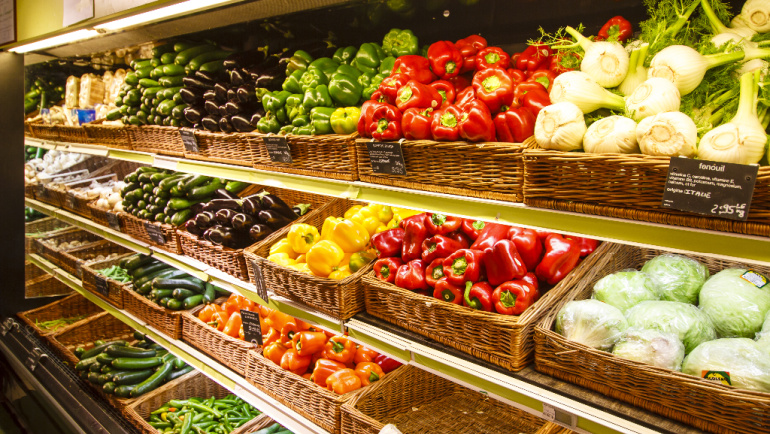
DETROIT — Wayne State University, the Detroit Food Policy Council and members of the Detroit Grocery Coalition today announced the Great Grocer Project, a community-based program to strengthen relationships between independently owned grocery stores and their customers in Detroit, while providing support to increase awareness and sales of healthy foods that foster economic vitality within Detroit neighborhoods.
Detroit is home to nearly 70 full-service grocery stores, almost all of which are family- or independently owned. These grocers have historically played a crucial role in maintaining food access in their neighborhoods and have been especially important as Detroiters navigate the coronavirus pandemic. The program — funded as a three-year project by the United States Department of Agriculture and for one year by the Michigan Department of Health and Human Services — is a joint initiative led by the Wayne State University College of Education’s Center for Health and Community Impact and the Detroit Food Policy Council. The Great Grocer Project seeks to promote Detroit’s grocers to improve community health and economic vitality through leadership and advancement of research, programs and policies for healthy living.
The Great Grocer Project will also train and host fellows in seven community-based organizations, which will then adopt a grocery store in each of Detroit’s districts. Fellows will work with store owners to help them better compete with big-box grocery stores by improving their relationships and communication with customers and conducting food and nutrition assessments at their stores.
Collaborative partners and members of the Detroit Grocery coalition include the City of Detroit Health Department and Office of Sustainability, the Detroit Economic Growth Corporation, Detroit Food Map Initiative, Eastern Market, the Midwest Independent Retailers Association, Fair Food Network, and the National Kidney Foundation of Michigan.
“Too often, Detroiters choose to shop outside the city to obtain their groceries and healthy foods,” said Rachael Dombrowski, who jointly directs the Great Grocer Project. “We want to reverse that tide and showcase grocers who are providing high-quality, affordable healthy foods to their customers within the city. By working directly with store owners and community organizations, we aim to improve their relationships, the grocery landscape within Detroit and the overall economic vitality of communities.”
Dombrowski is also assistant professor of community health education in the College of Education’s Division of Kinesiology, Health and Sport Studies and a research associate for the Center for Health and Community Impact. Her research is focused on community-based programs to improve nutritional and health outcomes and advance food justice.
In addition to direct support for store owners, the Great Grocer Project will work with 10 top-rated stores to improve their marketing and presentation of healthy foods by improving the look and feel of certain areas in the store, creating recipes and shelf tags to display with nutritious foods, and facilitating many more environmental improvements.
“We have seen the devastation of the coronavirus pandemic within our communities, and we know now how effective good nutrition can be on preventing death from coronavirus,” said Winona Bynum, executive director of the Detroit Food Policy Council and co-director of the Great Grocer Project. “We have also learned how important having access to a healthy grocery store has been over the past year. We look forward to continuing to work with our Detroit grocers and our community partners to improve access to high-quality, nutrient-rich foods needed for good health now and well beyond this pandemic.”
To learn more about the Great Grocer Project, contact Rachael Dombrowski at FY9585@wayne.edu or visit the Detroit Food Policy Council’s website at detroitfoodpc.org/committees/#dgc.
This work is supported by the Community Food Projects Competitive Grant Program grant no. 2020-33800-33132 from the USDA National Institute of Food and Agriculture. Any opinions, findings, conclusions, or recommendations expressed in this publication are those of the author(s) and do not necessarily reflect the view of the U.S. Department of Agriculture.
# # #
About the Wayne State University College of Education
The College of Education is anchored by its commitment to social justice, equity and inclusive excellence, and offers highly recognized degree programs in 37 areas, including teacher education, counseling, educational leadership and policy studies, educational psychology, educational research and evaluation, exercise and sport science, learning design and technology and sports administration. For more information, visit education.wayne.edu.
About the Center for Health and Community Impact
The Center for Health and Community Impact brings together educators, clinicians, scientists and community leaders devoted to advancing health, well-being, equity and life success throughout communities locally, regionally and nationally to improve community health and vitality through diverse and inclusive programs, advocacy, and research. To learn more, visit education.wayne.edu/health-community-impact.
About Wayne State University
Wayne State University is a premier urban research institution offering approximately 350 academic programs through 13 schools and colleges to more than 26,000 students. For more information, visit wayne.edu.
About the Detroit Food Policy Council
Established in 2009, the Detroit Food Policy Council is committed to nurturing the development and maintenance of a sustainable, localized food system and a food-secure city of Detroit in which all of its residents are hunger-free, healthy, and benefit economically from the food system that impacts their lives. To learn more, visit detroitfoodpc.org.
